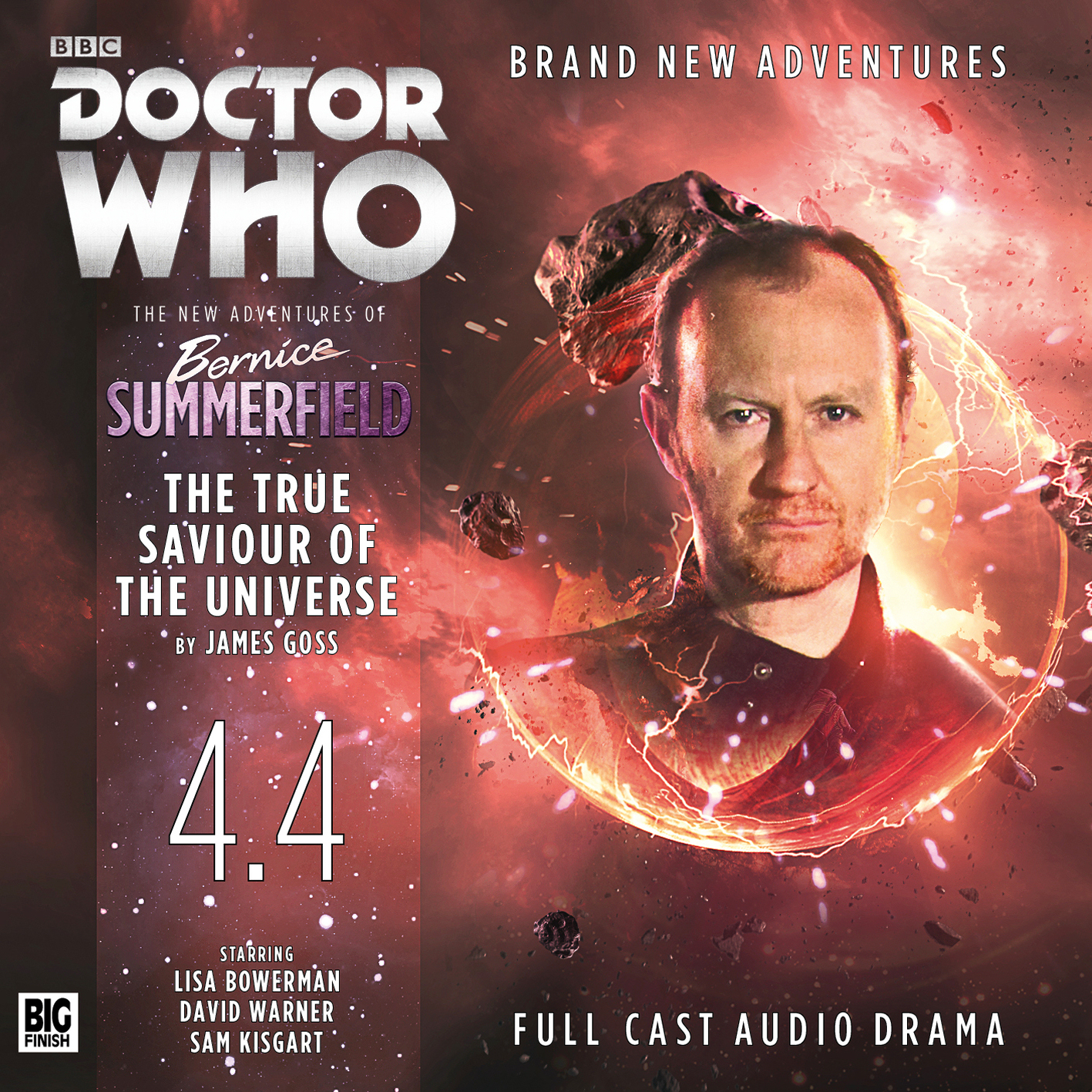The Diary of River Song – Series 4
Written by Emma Reeves, Matt Fitton,
Donald McLeary and John Dorney
Produced by David Richardson
Directed by Ken Bentley
Big Finish Productions, 2018
Stars: Alex Kingston, Tom Baker, Fenella Woolgar, Adele Lynch, Josh Bolt, George Asprey, John Asbury,
Tim Bentinck, Nigel Anthony, Nathalie Buscombe
“You’re not Romana!”
“Oh, I am …”
“You’re not! I haven’t even met her yet!”
“You haven’t … What? But how do you know about her then?”
“Because you told me!”
“Me?”
“Yes, you! You’re not Romana. You’re Professor River Song! You’re my wife!”
“I’m …?”
“Hello, sweetie!”
The Fourth Doctor meets River Song
Having pitted River Song (Alex Kingston) in her “standalone” series against the so-called “Rulers of the Universe”, the Speravore hive, and most recently Madame Kovarian and the Furies (not to mention earlier incarnations of her husband), Big Finish has upped the stakes for the maverick archaeologist with a new, seemingly invincible villain.The Discordia are, according to one of their number, an anarchical time travelling race which filled the power vacuum in the aftermath of the Time War. Unlike the Time Lords or even the Daleks, the Discordia have absolutely no regard for the integrity of the space/time continuum, using their temporal powers to conquer their enemies and even absorb their strengths through a “widening of the gene pool”.
This includes taking on forms that exploit the superstitions of the races they subjugate – such as, in the case of humans, the clichéd appearance of the devil, complete with (much to River’s initial amusement) horns, red skin, cloven hooves, forked tails and pitch forks! However, as River discovers, the Discordia “embrace their villainy” with pride and have a tenacious quality which pushes even her to the brink …
The first of the four instalments in this boxset – Time in a Bottle – lays the groundwork for the Discordia quite effectively. River is pitted against an academic rival in Professor Jemima Still (Fenella Woolgar) and accompanies her on an expedition to Lipiria, a world which exists in a timeless vacuum. They are joined on their mission by a giant warrior ant called Gammarae (Adele Lynch) and a cyborg academic called Spod (Josh Bolt). River in turn believes a certain Time Lord may have been caught in this timeless state but as she discovers, appearances can be deceptive …
Woolgar’s Jemima is the perfect foil to Kingston’s River. It is refreshing to see River bested by a peer in archaeology. While River is by far the cockier and more self-assured of the two archaeologists, Jemima is shrewd and calculating beneath all her fussiness, bluster and insecurity.There’s also a sense (as Woolgar perfectly conveys) that Jemima resents River’s academic feats, glamorous demeanour, and constant swagger. What is perhaps less convincing about Jemima is her sudden change of heart and selflessness at the conclusion to the tale; it just doesn’t ring true, given she has partially set up the story’s chain of events in the first place.
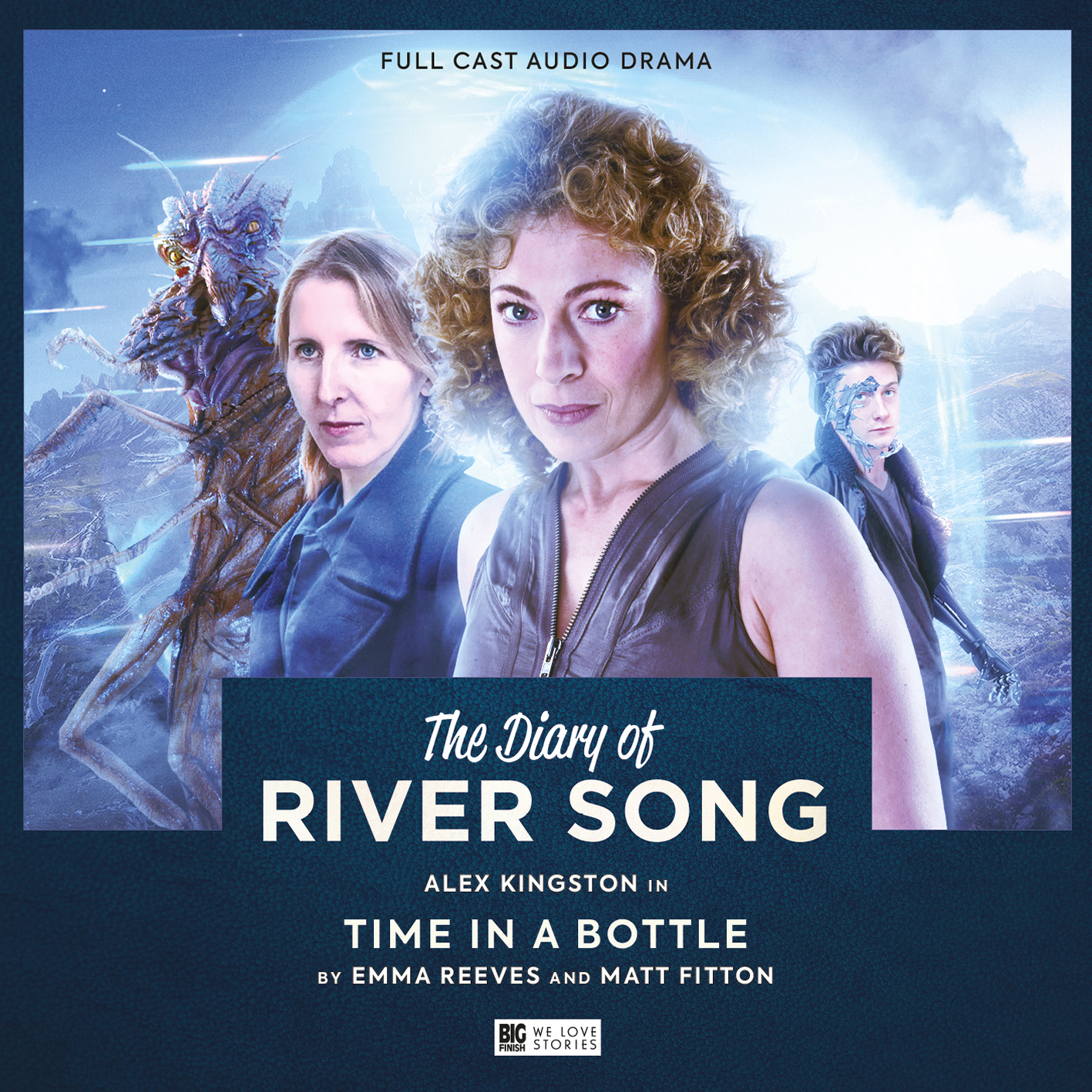
Donald McLeary’s script is the weakest entry in this set – it feels like a retread of the 1965 Doctor Who serial The Chase (and indeed that adventure is acknowledged as an inspiration in the CD extras). River and her friends visit a range of strange times and places before there is a showdown in a deserted colony whose robot caretakers have been waiting thousands of years for humans to arrive (shades of the Mechanoids, anyone?).
The episode still has some memorable highlights, though, as Alex Kingston excels herself in dual roles – as River and a River android duplicate (which considers itself a few “percentiles sexier” than the original!). The android proves to be the perfect foil for Melak, and often gets the best dialogue and wisecracks – even better than River herself!
Special mention also goes to performer Ewan Bailey who employs a wide range of voices and accents to portray a string of hapless and villainous characters (his Rattis is simultaneously flamboyant and creepy).
The third instalment Whodunnit? also provides plenty of scope for Kingston to test her range. Once more adopting her private detective guise of Melody Malone, River is thrust into a murder mystery scenario reminiscent of the game Clue,
Whodunnit? is naturally a homage to the detective and crime noir genre, with the supporting characters very clearly based on other fictional investigators, eg Hercule Poirot, Sherlock Holmes, Father Brown, Lord Peter Wimsey, Doctor Who’s own Madame Vastra and Jenny Flint, and even Scooby-Doo! However, it’s also very Kafka-esque in its execution, with many concepts in the tale inspired by Kafka’s great works, including The Metamorphosis, The Trial and The Castle. This peculiar blending of genres and sub-genres would be just plain confusing in less accomplished writing hands than the boxset’s script editor Matt Fitton but makes complete sense once River truly begins to appreciate the gravity of her situation.
The curiously titled Someone I Once Knew closes out the set, with Tom Baker’s Doctor completing River’s tour of all the surviving classic TV series Doctors in what are supposed to be her “solo” adventures. Scribe John Dorney, however, mischievously turns the concept of River meeting her husband’s incarnations in reverse order on its head.
On TV and in some of BF’s audio adventures, River is armed with plenty of future knowledge about the Doctor’s adventures; the further back she ventures down his time stream, the less knowledgeable he is about her. However, in this meeting, it’s the Doctor that is apparently armed with foreknowledge about his wife, particularly of events that she either hasn’t experienced or which lie in her personal future.
Kingston and Baker are a delight to hear on audio and it’s a pairing that probably deserves another team-up in the Big Finish range (albeit in the ongoing Fourth Doctor Adventures, not River’s own series). It’s as much a combination of Dorney’s dialogue as well as the artistes’ performances but there are some wonderful moments of humour between the two, as well as some heartening moments as the Fourth Doctor’s romantic side comes to the fore:
The Doctor: What was that thing you used to disable General Dante’s gun? I don’t approve of guns!
River: It wasn’t a gun – it was my sonic trowel!
The Doctor: A what? A trowel? Why you little Gertrude Jekyll, you, I didn’t notice you doing any gardening!
River: It’s a variation on your screwdriver!
The Doctor: In what way? My screwdriver is just a screwdriver!
River: At the moment it is! Let’s just say you go crazy with the optional upgrades! Look, can we save the marital for later on? I think we need to get away!
The Doctor: You’re probably right! Here we go – on the run, together, almost like old times!
River: Oh, new old times for me!
The Doctor: I’m delighted to be with you. There’s no where I’d rather be. Just the two of us – together as disaster swamps the universe!
River: Flatterer!
The Doctor: Oh, don’t lie! You adore it!
While the general trappings of this final serial are very much rooted in traditional science fiction – with the Doctor and River initially playing a temporal game of “cat and mouse” with the Discordia and the Doctor agitating the token rebels to strike back against their Discordia oppressors (“My dear, I am always with the rebels!”) – it also contains very strong undercurrents of love, loss and regret. These themes are personified in the Discordia’s stagnant Emperor (Nigel Anthony) and the villainous Dante (Nicholas Asbury) who has designs on both the imperial throne and River herself. Given the romantic air of the serial, the conclusion is consequently bittersweet. (Personally, I detest this type of resolution, which is a SF cliché – and tantamount to lazy writing – but given the level of selflessness that underpins it, I’m prepared to let it through to the keeper – and it’s pointless railing against it anyway!)

By comparison, the voices of the other aliens that feature throughout the set are untreated. Adele Lynch’s Gammarae and even Fenella Woolgar’s Formidian Queen in Time in a Bottle portray the giant ant-like creatures with largely natural voices – but the two actors give their characters clipped, brisk tones (in manners that are meant to reflect the swift thinking of giant ants). In fact, Woolgar’s performance as the Queen is so different from her major role as Jemima Still that you don’t realise until the end credits that she in fact plays two characters.
Josh Bolt’s Spod has a treated electronic voice but it is also in a subtler vocal range than the Discordia. Some of the minor alien characters encountered in Kings of Infinite Space and Someone I Once Knew also speak in more natural, largely untreated tones than the Discordia. It implies that to make the “big bad” of this set seem so intimidating, the sound designers felt treating the voices would be effective (which hardly works when we meet plenty of dim-witted and obsequious Discordia!). Yet it is clear from my experience of watching and listening to a lot of SF over the years that it’s sometimes better to just let the actors’ natural voices prevail.

Series 4 of The Diary of River Song is an entertaining addition to River’s audio adventures and works all the better for limiting past Doctors’ involvement in the overall narrative (which has not been the case in some of the earlier sets, notably Series 2). We get to see River in charge of her own expedition, racing through time and space with two non-human companions and a vortex manipulator, and besting herself against the wild imagination of Franz Kafka.
Much like Doctor Who more broadly, River’s adventures are certainly not bereft of imagination. However, it would still be interesting to hear more of River’s exploits as an archaeologist (even after four volumes there have only been hints) rather than bogging her down in the continuity of meeting her husband in reverse order and multiple incarnations of the Master/Missy in the forthcoming Series 5 boxset.



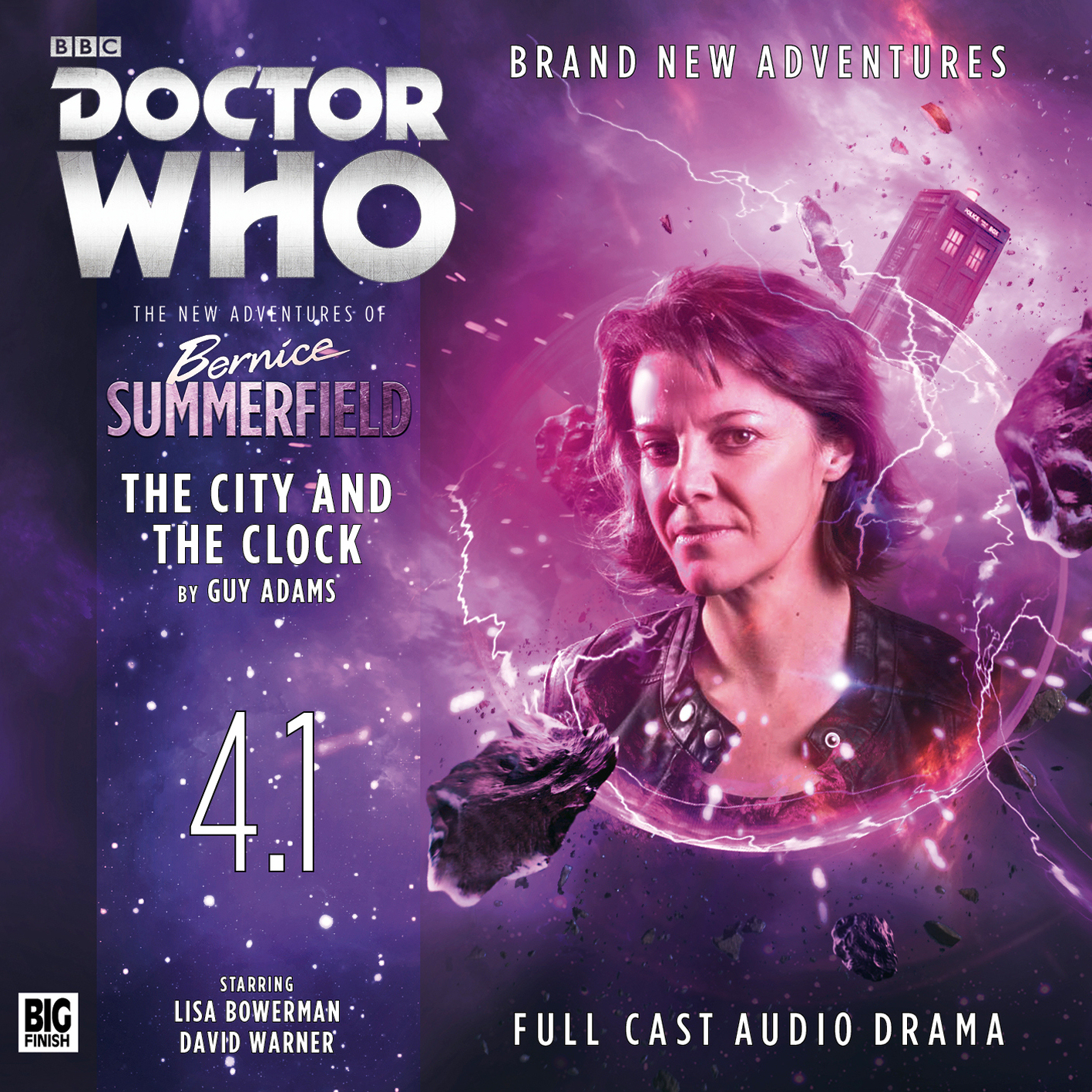 Otherwise, aside from terrific dialogue, the plotline of The City and the Clock – and the premise behind the clock – is entirely forgettable. It’s a pity because writer Guy Adams clearly devises the story to put Benny back into her element – yet the tale, which is slow from the get-go, never builds to a dramatic crescendo, and Benny doesn’t get to employ the smarts that make her such a terrific archaeologist.
Otherwise, aside from terrific dialogue, the plotline of The City and the Clock – and the premise behind the clock – is entirely forgettable. It’s a pity because writer Guy Adams clearly devises the story to put Benny back into her element – yet the tale, which is slow from the get-go, never builds to a dramatic crescendo, and Benny doesn’t get to employ the smarts that make her such a terrific archaeologist.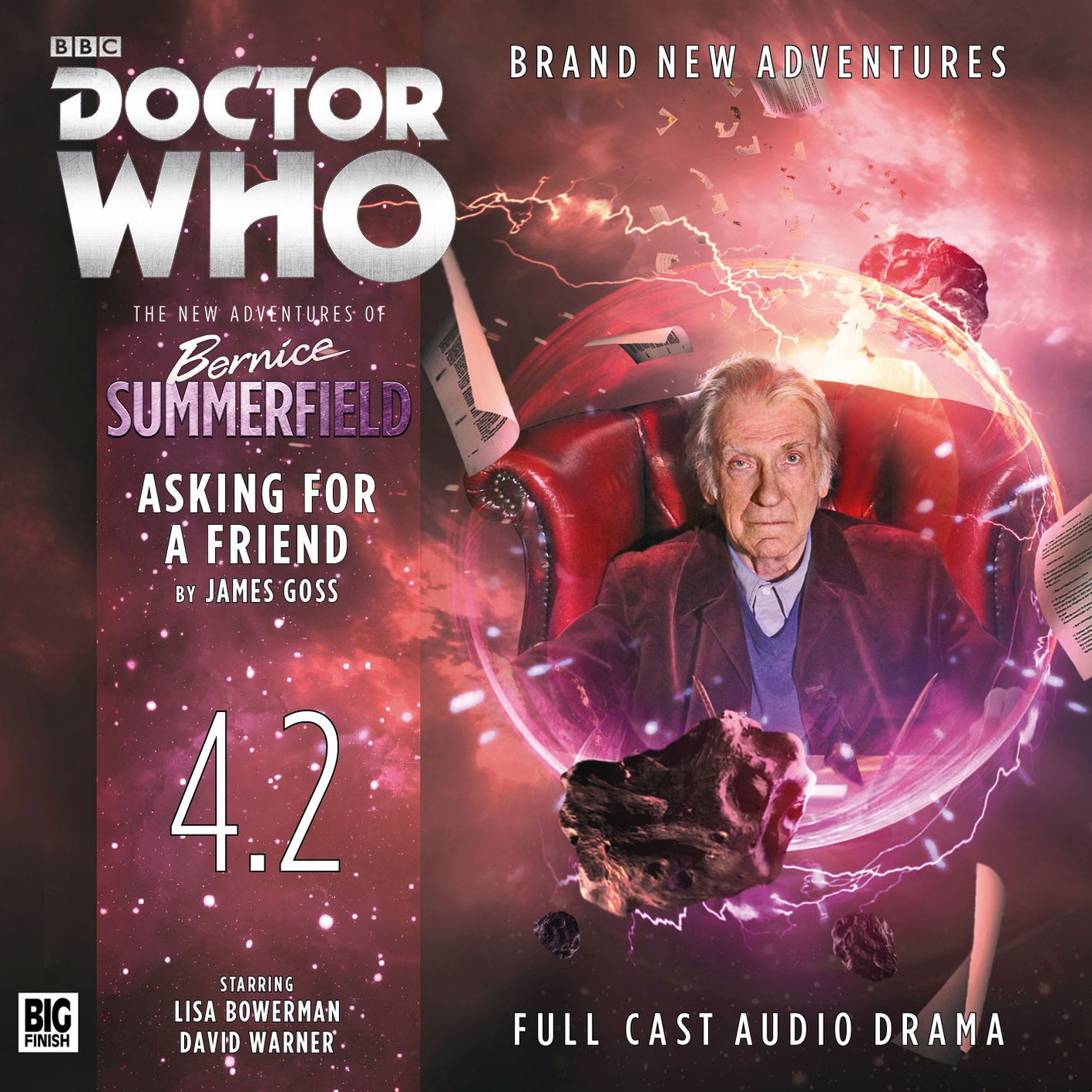
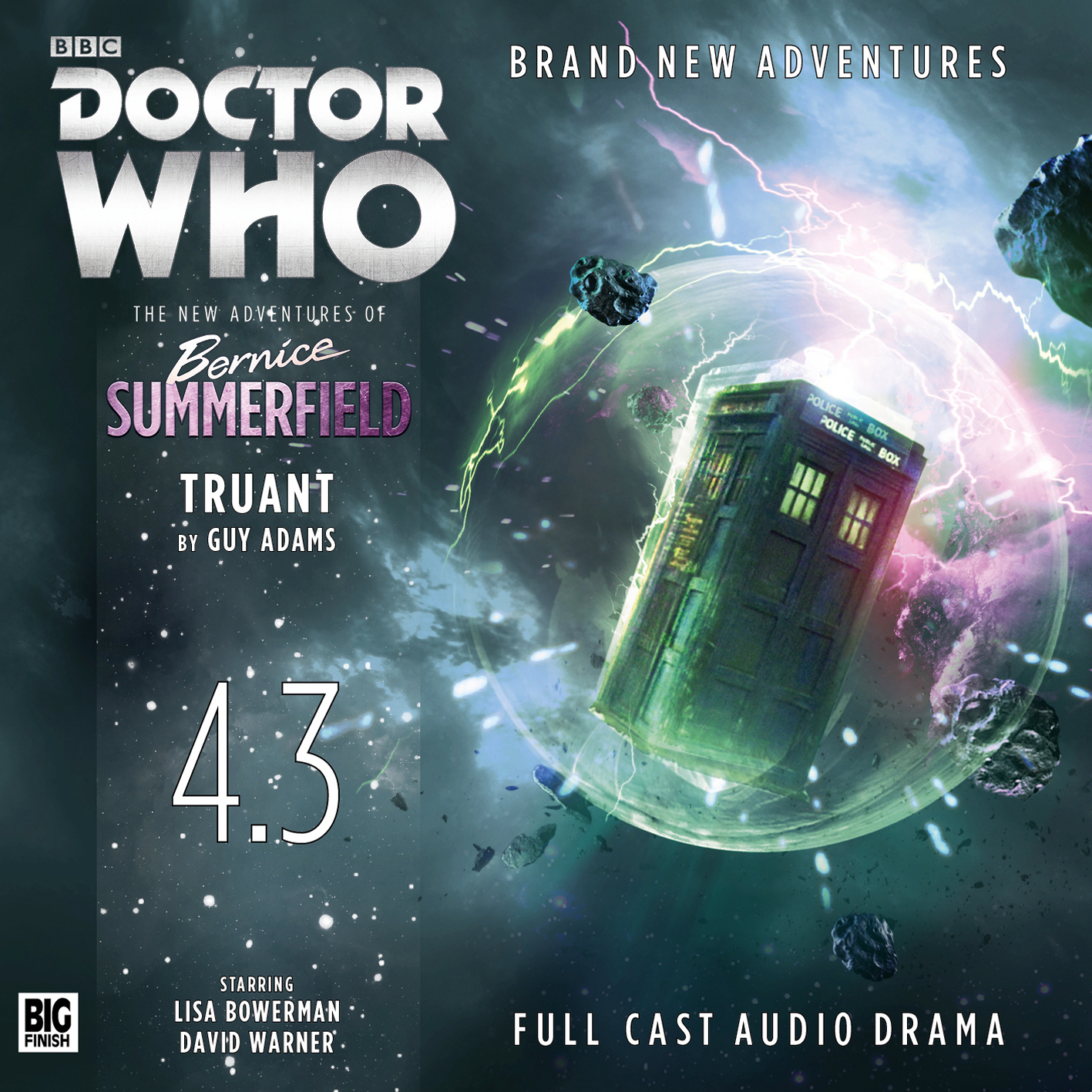 The boxset closes with The True Saviour of the Universe, as the Doctor upon his return to parliament is arrested and thrust into impeachment proceedings. Much to Benny’s suspicion, the arrest coincides with the sudden arrival of this universe’s incarnation of the Master (Sam Kisgart, aka Mark Gatiss) and the emergence of a hooded figure which has been offering parliamentarians incentives to oust the Doctor from office since the events of The City and the Clock. Are they connected? Does the Master have designs on the presidency, so he can hijack the Apocalypse Clock? James Goss’s clever script challenges and upturns all the listener’s expectations while poking fun at all of Doctor Who’s conventions.
The boxset closes with The True Saviour of the Universe, as the Doctor upon his return to parliament is arrested and thrust into impeachment proceedings. Much to Benny’s suspicion, the arrest coincides with the sudden arrival of this universe’s incarnation of the Master (Sam Kisgart, aka Mark Gatiss) and the emergence of a hooded figure which has been offering parliamentarians incentives to oust the Doctor from office since the events of The City and the Clock. Are they connected? Does the Master have designs on the presidency, so he can hijack the Apocalypse Clock? James Goss’s clever script challenges and upturns all the listener’s expectations while poking fun at all of Doctor Who’s conventions.